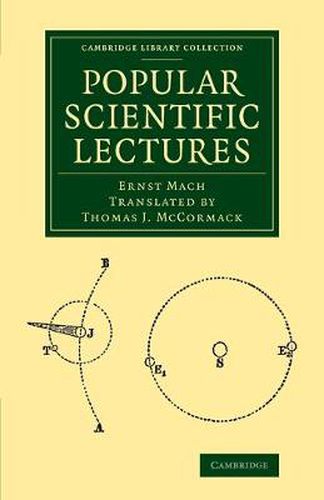Readings Newsletter
Become a Readings Member to make your shopping experience even easier.
Sign in or sign up for free!
You’re not far away from qualifying for FREE standard shipping within Australia
You’ve qualified for FREE standard shipping within Australia
The cart is loading…






The Austrian scientist Ernst Mach (1838-1916) carried out work of importance in many fields of enquiry, including physics, physiology, psychology and philosophy. Many significant thinkers, such as Ludwig Wittgenstein and Bertrand Russell, benefited from engaging with his ideas. Mach delivered the twelve lectures collected here between 1864 and 1894. This English translation by Thomas J. McCormack (1865-1932) appeared in 1895. Mach tackles a range of topics in an engaging style, demonstrating his abilities as both a researcher and a communicator. In the realm of the physical sciences, he discusses electrostatics, the conservation of energy, and the speed of light. He also addresses physiological matters, seeking to explain aspects of the hearing system and why humans have two eyes. In the final four lectures, he deals with the nature of scientific study. The Science of Mechanics (1893), Mach’s historical and philosophical account, is also reissued in this series.
$9.00 standard shipping within Australia
FREE standard shipping within Australia for orders over $100.00
Express & International shipping calculated at checkout
The Austrian scientist Ernst Mach (1838-1916) carried out work of importance in many fields of enquiry, including physics, physiology, psychology and philosophy. Many significant thinkers, such as Ludwig Wittgenstein and Bertrand Russell, benefited from engaging with his ideas. Mach delivered the twelve lectures collected here between 1864 and 1894. This English translation by Thomas J. McCormack (1865-1932) appeared in 1895. Mach tackles a range of topics in an engaging style, demonstrating his abilities as both a researcher and a communicator. In the realm of the physical sciences, he discusses electrostatics, the conservation of energy, and the speed of light. He also addresses physiological matters, seeking to explain aspects of the hearing system and why humans have two eyes. In the final four lectures, he deals with the nature of scientific study. The Science of Mechanics (1893), Mach’s historical and philosophical account, is also reissued in this series.